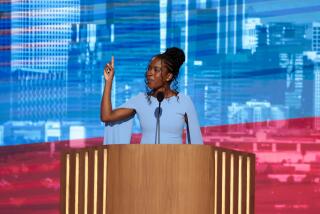Poetry’s Keepers Share Passion
NEWTOWN, Pa. — Written on the wall of a parking garage. Discussed in a prison reading group. Read aloud at a Habitat for Humanity groundbreaking.
With words, rhyme, meter and a little unconventional thinking, laureates are trying to make poetry a part of life in every corner of the country, from Newtown, Pa., to Portsmouth, N.H., to Naples, N.Y.
“In the United States we’ve come to look at poetry as extraneous, not at all practical,” said Allen Hoey, poet laureate of Bucks County, Pa. “There’s a very long history of poets being central to civic life.”
Unlike the poet laureate of the United States--America’s official poet who receives national attention and presides over readings in Washington--city and county poet laureates aren’t usually well known. Most publish on a small scale, have day jobs and receive little, if any, money.
Past U.S. poet laureates have included Robert Penn Warren, Rita Dove and Robert Frost. The latest is Billy Collins, who received a six-figure advance to sign with Random House. Ten thousand copies of his book of poetry, “Sailing Alone Around the World,” were sold last June, the month he was named poet laureate by the Library of Congress.
But regardless of fame and success, the role of educating people about poetics is the same.
Hoey says reading and writing poetry have always been his passions. A professor at Bucks County Community College in Newtown, his basement office is crammed with floor to ceiling bookshelves filled with worn volumes of William Blake, Ezra Pound and Ted Hughes, England’s former poet laureate.
His term lasts a year and he is the 25th poet laureate in Bucks County, which has one of the older programs around.
Hoey, whose shaggy hair and wire-rimmed glasses are offset by denim jeans and sneakers, says he would like poets to be more recognized in the area.
“I think it’s a shame and an impoverishment that we don’t see poets as being vital,” he says. “We’re here. Try to use us more.”
Hoey treasures the moments when his position is appreciated. One of the “coolest” experiences of his laureate tenure happened recently when a woman approached him in the street.
“She said, ‘You’re the poet, aren’t you? This is going to be a good day--I saw the poet,’ ” Hoey recalled.
Rules surrounding laureates vary from town to town. The terms range from one to four years and duties can include writing poems for official occasions or developing a poetry event.
In Northampton, Mass., Portsmouth, N.H., and Bucks County they receive a small grant--less than $1,000 a year.
Of the local laureates, Martin Espada, 45, is easily the best known. The University of Massachusetts professor has published six books of poetry and has won many awards and fellowships, including an American Book Award. He is the first poet laureate of Northampton and has served half of his two-year term.
Espada says he has tried to introduce poetry to high schools and prisons.
“In high schools what are we focused on? Taking tests. Those kids tend to fade away and end up in the parking lot, which is where I spent most of my high school,” says Espada, who grew up in Brooklyn, N.Y. “I think you’ll find a great potential for poetry right there.”
Naples also has a first-time poet laureate. The artistic community appointed former minister and local writer Sheldon Flory, 74, to the post earlier this year. Flory has already written a poem about the town park.
The poet laureate in Harrisburg, Pennsylvania’s conservative capital, also works in schools. Iya Isoke was appointed in January by the mayor, who since 1982 has chosen a laureate for each of his four-year terms. As a “spoken-word poet,” she tries to show kids the similarities between rap and poetry.
“I show the kids how to articulate their thoughts,” she says. “You can get out anger, pain, happiness--you can get all of that out through words.”
Isoke, 34, hopes to open a spoken-word poetry club.
Reaching people through poems is what makes the job exhilarating, the laureates say.
Maren Tirabassi, 51, Portsmouth’s third poet laureate since the town’s program began five years ago, says she already sees changes there.
“A lot more people think of poetry as not being exclusively academic or intellectual but available to them,” she says.
Tirabassi says her project is to put together an anthology of poems about Portsmouth. The laureate before her tried to add poetry to the town’s physical landscape.
“One of the things my immediate predecessor did is poetry in public places--poetry in the parking garage and the wharf, buildings, coffee shops,” she says. “That was his piece of getting poetry out to people who never pick up a book. But they’re parking their car and see a Robert Frost poem and they go, ‘Oh!’ ”
More to Read
Sign up for our Book Club newsletter
Get the latest news, events and more from the Los Angeles Times Book Club, and help us get L.A. reading and talking.
You may occasionally receive promotional content from the Los Angeles Times.








